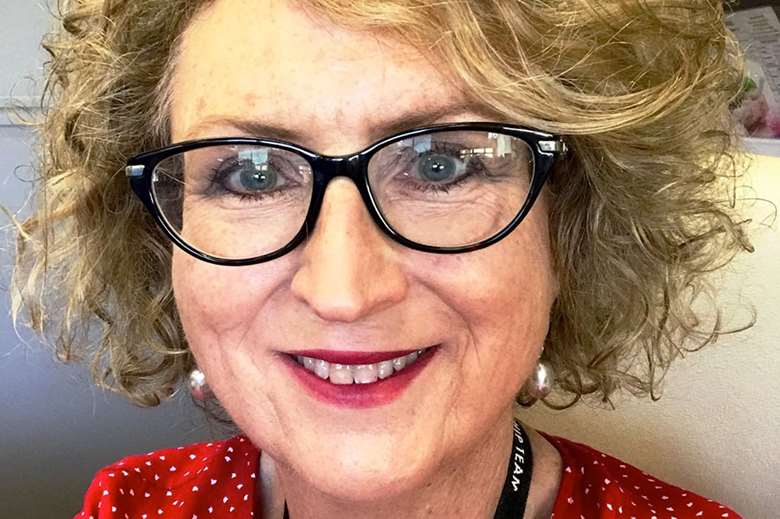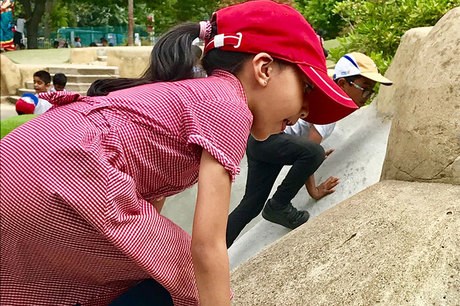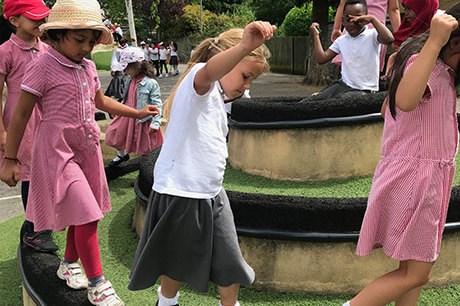Don't let 'urban cramping' hamper children's physical literacy
Kathryn Harper Quinn, head teacher, Hounslow Heath Infant School
Tuesday, June 26, 2018
Head teacher Kathryn Harper Quinn, a lead school ambassador for the Youth Sport Trust, explains how to get children hooked on movement for life.

Hounslow Heath Infant School is situated in a London borough that shares the same challenges as many neighbouring boroughs across the UK’s capital where there are crowded living conditions.
Many families have to manage with a lack of physical space, both inside and outside, and so many of the children that come through our doors are not as confident or competent in their physical development as they perhaps could be.
During Youth Sport Trust’s National School Sport Week (25 - 29 June), and as the charity engages hundreds of thousands of early years children through its partnership with Entertainment One’s PJ Masks, we are raising awareness around supporting children to develop physical literacy, which in turn will feed into school readiness and academic achievement.
At Hounslow Heath Infant School, we believe that in order to do this, the Government and schools need to work together to regain the balance between the need for extensive evidence of abstract learning through endless testing, and allowing children in nursery and Reception in particular, to become physically stronger and well-coordinated.
This in turn, will ensure a far more effective basis for academic achievement. At our school, we do not sacrifice academic achievement. All pupils now make good or outstanding progress across the four year groups. We have also seen a decrease in obesity rates from Reception to Year 2.

Hounslow Heath Infant School
We believe that in this country, the focus is too heavily on just academic achievement with excessive amounts of time and energy wasted on abstract recording and testing. Measurement of progress and achievement are important, but they should not be at the expense of children’s physical literacy skills, wellbeing and obesity rates.
This country’s overemphasis on academic progress has allowed the situation to develop where families have been led to believe that only this is the concern for their children. We see pupils coming into nursery who do not have the co-ordination or confidence that we would expect for their age and stages of development. Many arrive in buggies to nursery, parents carry their bags for them, put their coats on and dress them, and as a result the children become accustomed to having everything done for them.
They’re often not even physically confident enough to run, jump or move freely and that is a huge concern. The link between more physical activity and opportunities to develop the basic physical literacy skills are the foundation upon which other learning sits. Increase these opportunities, and you will have better academic outcomes.
Otherwise we face a very uncertain future with a generation growing up who struggle with movement and may not feel comfortable with their own bodies. This in turn can lead to all sorts of other social challenges and unhealthy futures physically, academically and socially.
Humans are born wanting to move but we seem to limit this progress and fail to build on this most natural instinct. Rarely do we have to teach a baby to roll over or pull themselves up or start to take its first steps. But it seems once they are up, we sit them down again in front of a screen, or in a buggy or in a car and there they stay until they come to school and in too many cases, beyond. While this may be well meaning in terms of keeping them safe, it is also vastly reducing their opportunities to continue to build their physical skills and make the essential links between movement, language and cognitive development. It appears it is also making a generation overweight or obese and is leading to further worrying issues of challenging behaviour, inability to build good strong positive friendships and the resilience needed for good mental health.
Families need to provide their children with the time and space to develop these skills before they come to school. Parents can be supported in this with clear guidance of ways they can help! We have developed guidance of things for parents to consider before children start nursery, so it acts as a helpful prompt to shape thinking around the importance of movement.

Hounslow Heath Infant School
Over the past few years as part of our Earth Curriculum at our school, we have developed our Personal Best Programme. This reflects the similar work developed by the Youth Sport Trust’s pilot My Personal Best Primary programme and both provide small children with opportunities to get a little better each day with simple but important physical skills. Young children especially need to see their progress and be motivated to move for themselves, not because they are being told to by an adult! This is what will lead to a lifelong love of movement and it becoming part of what they are about!
We all need to understand that although we may be teaching physical literacy and following the steps to help children improve and keep active, the results will not be immediate but will have significant impact on the quality of their lives.
Top tips for building physical literacy
- Create the right environment. It is crucial to encourage children to build their confidence to move and explore. Environments should be developed that challenge and excite. From the age of two, children should be able to confidently go out by themselves and have a slide, climb over some tyres, or follow a large raised snake along its back!
- They need to enjoy themselves. If they’re not having fun, we will miss these vitally important early years to hook them on a love of lifelong movement and enjoy what they are doing to keep active. We should not have to provide them with the motivation to move. The environment should do that for us!
- Understand the importance of physical literacy. We have some children come in to pre- nursery sessions and some of them cannot stand or sit easily. Work with parents is hugely important to help them understand that teaching their children to move and be active is just as important as anything academic, if not more.
- Make a mud kitchen/water play area/sand space! These allow children to play and develop, build co-ordination, and support the skills needed for writing.
- Build the essential association between language and movement. When a child is climbing – tell them they are going higher, if they are running tell them they are running faster. If playing with water, discuss capacity in mathematical terms! No need to write it down yet. The learning will have already taken place. Move on and talk about the next thing they are doing!
- Just keep moving and this will provide endless possibilities for health, happiness and academic achievements.
Kathryn Harper Quinn is Head Teacher of Hounslow Heath Infant School. For more information on the Youth Sport Trust’s My Personal Best Primary to help children achieve their personal best and develop physical literacy and to register an interest contact solutions@youthsporttrust.org




